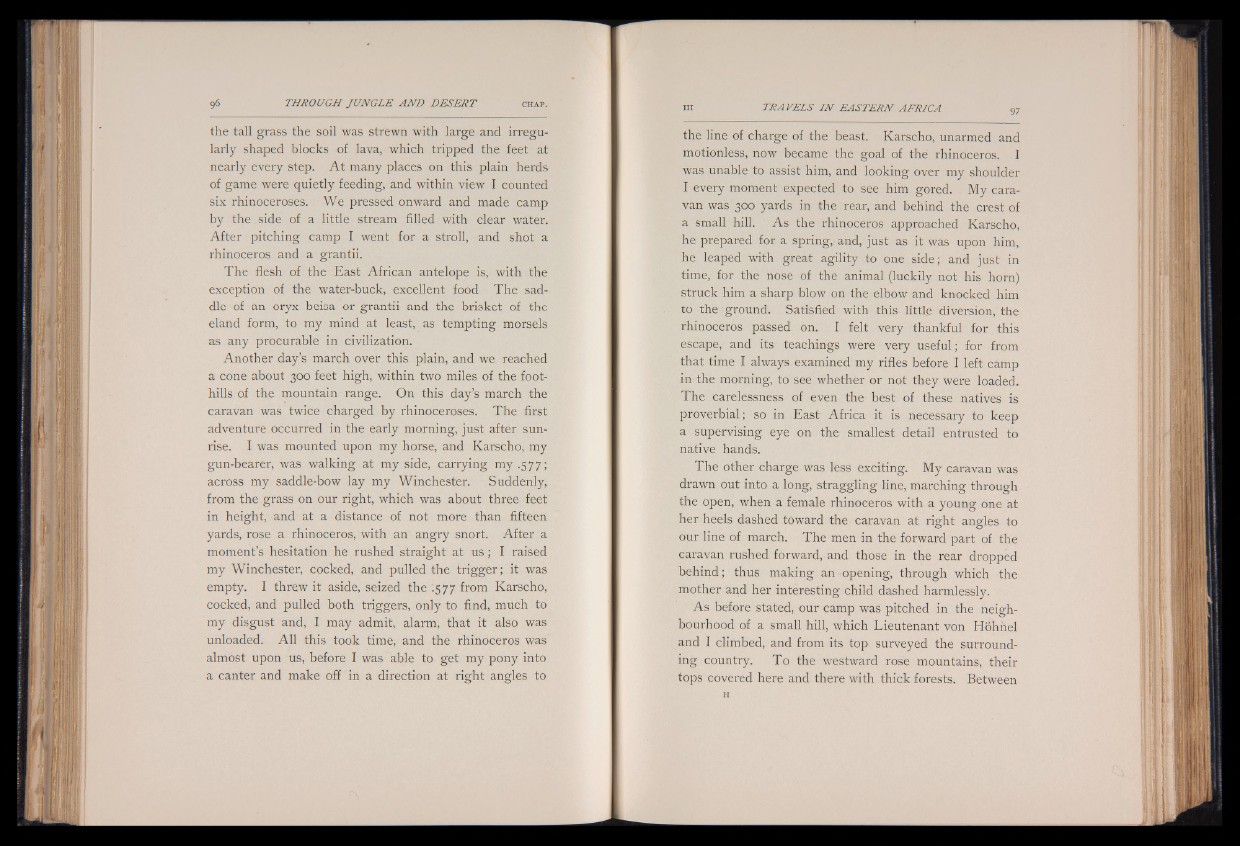
the tall grass the soil was strewn with large and irregularly
shaped blocks of lava, which tripped the feet at
nearly every step. A t many places on this plain herds
of game were quietly feeding, and within view I counted
six rhinoceroses. We pressed onward and made camp
by the side of a little stream filled with clear water.
After pitching camp I went for a stroll, and shot a
rhinoceros and a grantii.
The flesh of the East African antelope is, with the
exception of the water-buck, excellent food The saddle
of an oryx beisa or grantii and the brisket of the
eland form, to my mind at least, as tempting morsels
as any procurable in civilization.
Another day’s march over this plain, and we reached
a cone about 300 feet high, within two miles of the foothills
of the mountain range. On this day’s march the
caravan was twice charged by rhinoceroses. The first
adventure occurred in the early morning, just after sunrise.
I was mounted upon my horse, and Karscho, my
gun-bearer, was walking at my side, carrying my .577;
across my saddle-bow lay my Winchester. Suddenly,
from the grass on our right, which was about three feet
in height, and at a distance of not more than fifteen
yards, rose a rhinoceros, with an angry snort. After a
moment’s hesitation he rushed straight at u s ; I raised
my Winchester, cocked, and pulled the trigger; it was
empty. I threw it aside, seized the .577 from Karscho,
cocked, and pulled both triggers, only to find, much to
my disgust and, I may admit, alarm, that it also was
unloaded. All this took time, and the rhinoceros was
almost upon us, before I was able to get my pony into
a canter and make off in a direction at right angles to
the line of charge of the beast. Karscho, unarmed and
motionless, now became the goal of the rhinoceros. I
was unable to assist him, and looking over my shoulder
I every moment expected to see him gored. My caravan
was 300 yards in the rear, and behind the crest of
a small hill. As the rhinoceros approached Karscho,
he prepared for a spring, and, just as it was upon him,
he leaped with great agility to one side; and just in
time, for the nose of the animal (luckily not his horn)
struck him a sharp blow on the elbow and knocked him
to the ground. Satisfied with this little diversion, the
rhinoceros passed on. I felt very thankful for this
escape, and its teachings were very useful; for from
that time I always examined my rifles before I left camp
in the morning, to see whether or not they were loaded.
The carelessness of even the best of these natives is
proverbial; so in East Africa it is necessary to keep
a supervising eye on the smallest detail entrusted to
native hands.
The other charge was less exciting. My caravan was
drawn out into a long, straggling line, marching through
the open, when a female rhinoceros with a young one at
her heels dashed toward the caravan at riOg ht an ocries to
our line of march. The men in the forward part of the
caravan rushed forward, and those in the rear dropped
behind; thus making an opening, through which the
mother and her interesting child dashed harmlessly.
As before stated, our camp was pitched in the neighbourhood
of a small hill, which Lieutenant von Hohnel
and I climbed, and from its top surveyed the surrounding
country. To the westward rose mountains, their
tops covered here and there with thick forests. Between
H